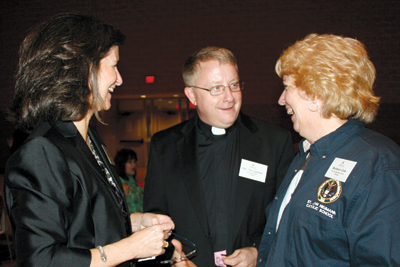
 COLUMBIA—The combination of strong moral teaching and strong academics can help Catholic schools be a welcome beacon in an increasingly secular culture.
COLUMBIA—The combination of strong moral teaching and strong academics can help Catholic schools be a welcome beacon in an increasingly secular culture.
The key is to make more people aware of what they offer, according to Bishop Robert E. Guglielmone.
The bishop offered his support and encouragement when he met with more than 100 Catholic school principals,
pastors and members of advisory councils from the Diocese of Charleston at a special dinner Nov. 10 in the Rowland Center at St. Joseph Church.
Sister Julia Hutchison, diocesan superintendent of schools, said the dinner provided a rare chance for the three groups to talk, share ideas and support each other.
During the meeting, information was distributed about an upcoming campaign marketing Catholic schools under the slogan “Authentically Catholic, Academically Excellent.” The effort will include billboards located around the state during Catholic Schools Week, Jan. 31 to Feb. 6, 2010.
In his talk, Bishop Guglielmone recalled his school days, the five years he spent as a teacher in New York public schools, and the distinguished history of Catholic education in the United States.
He spoke about Sts. Jean Baptiste de la Salle and John Bosco, who felt the church needed to play a role in educating poor children and elevating their self-worth. He called St. Elizabeth Ann Seton the “mother of the school movement here in the U.S.,” because of her outreach to poor women and her belief that educational advancement should be available to everyone. He also spoke about Mother Cabrini, who helped start ethnic parishes in the United States and believed Catholic education could help children from diverse backgrounds learn English and what it meant to be an American.
The bishop said many changes have affected Catholic schools in recent years, including a change in the way they are funded and the decline in the number of priests and religious who teach.
Schools struggle to pay salaries and other costs while still remaining affordable, he said, and often those who could benefit most from Catholic education are shut out because of costs. In too many cases around the country, Catholic schools have evolved into something more like a private school, where academics are still strong but Catholic identity is watered down, he said.
“People are starting to go back and look at the roots of Catholic education and what makes it special,” the bishop said. “A Catholic school brings a certain fullness and completeness of ministry to the parish. In the Catholic schools where I grew up, faith wasn’t simply something done on Sunday. Its influence permeated every part of our experience.”
Bishop Guglielmone said it was a concern that enrollment across the diocese was down about 300 students from the 2008-09 school year, and he would like to form a task force to determine “new ways of financially strengthening our schools” and making sure every available desk is filled.
He said the Catholic schools offer both an academic and moral foundation that produces the kind of students who make outstanding job candidates, and he would like to work with businesses around the state to help with fund-raising and building endowments to support the schools.
“Kids in public schools are kids living in a secular culture, one that sometimes is an atheistic culture,” he said. “Our schools can help keep them focused on the presence of God in their lives and the importance of the church in their lives.
“We need to keep the superior academic excellence, especially in a state that continues to struggle with education. But we also need to maintain a strong Catholic identity in our schools, so that the faith permeates every aspect of life in the school.
“We can’t allow our schools simply to be ‘private’ schools. Catholic schools can be a beacon of hope and light,” the bishop said.
